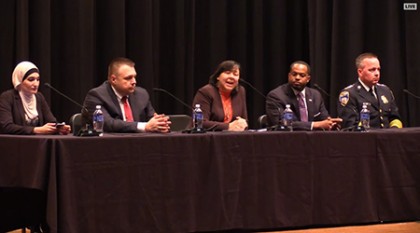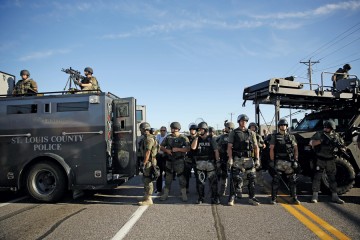The past year has redefined the future of America's policing in many ways, Baltimore City Police Commissioner Kevin Davis suggested Tuesday night at a Foreign Affairs Symposium panel discussion at Johns Hopkins University.

Image caption: Panelists speaking at the Foreign Affairs Symposium, from left: Linda Sarsour, Mark Puente, Margaret Huang, Nick Mosby, and Kevin Davis.
"We're in a sea change," he said.
But Linda Sarsour, executive director of the Arab American Association who also participated on the panel, argued that 2015 was not that unusual for members of minority communities who are disproportionately targeted by police.
"I don't know about you, but nothing changed for me in 2015," she said. "It's not a year where more unarmed black people were being killed. It was just that we were hearing more stories about them because people were fed up. Enough was enough."
In 2015, more people captured evidence of police misconduct on the smart phones in their pockets, she said. The difference, she added, is accountability.
The exchange sparked a lively—and at times heated—conversation about the role of police departments in communities. Davis and Sarsour were joined for the discussion—held at JHU's Shriver Hall and titled "The Future of Policing in America"—by Baltimore City Council member and mayoral candidate Nick Mosby, and Mark Puente, a Baltimore Sun writer who is one of the nation's leading investigative journalists. Margaret Huang from Amnesty International moderated.
The panelists agreed that the abuse of power, racial profiling practices, and lack of transparency that are commonplace at many police departments around the country—including Baltimore's police department, Davis acknowledged—have been many years in the making. Davis questioned the war on drugs, asking, "How did this police department become a one-dimensional police department that adopted zero tolerance policing strategies and arrested and sieged entire communities?"
Sarsour suggested that the prison industrial complex ensures a lack of accountability. Part of a police officer's duty includes cooperating with prosecutors to indict and prosecute criminals. How is it then possible, she argued, for those same prosecutors to investigate alleged criminal misconduct by officers they have worked alongside in the past? The only way to avoid such a conflict of interest is to appoint a special prosecutor, which rarely happens, she said.
"The whole damn system is guilty as hell," she said, quoting a popular protest chant.
Puente discussed the police corruption and misconduct described in a Baltimore Sun series titled "Undue Force". In 2011 through 2014, Puente found, more than 100 cases of criminal police misconduct were settled by Baltimore City, resulting in damages amounting to nearly $6 million. Many of the cases involved the same police officers.
The problem with these municipal settlements, Mosby said, is that non-disclosure agreements protected guilty officers, who could—and did—repeat their offenses.
"Having this gag order in place does nothing more than eliminate transparency for the community," Mosby said.
Additionally, local governments often face challenges in enacting meaningful reform. Both Mosby and Puente agreed that passing police legislation can be especially fraught in Maryland, where Baltimore is unique in its needs and the issues it faces. The reforms that Baltimore residents request—including laws governing when police may use force—often do not have support from representatives in rural counties, whose police departments do not encounter the same issues.
"Our communities are political footballs," Sarsour said.
To illustrate how outdated state laws can be, Davis noted that possession of an eighth of an ounce of crack cocaine carries a felony charge, whereas possession of an illegal firearm only constitutes a misdemeanor. The laws do not reflect current social values, including treating drug addiction as a health concern rather than a criminal offense.
"So we've got some talking to do," he said. "We're not at the place yet where the laws are reflecting our conversation."
But he expressed hope of a shift to more ethical policing. He noted that in two of the three most recent criminal police misconduct cases the BPD has brought against its officers, it was the police who provided testimony in the cases.
"Those cases never would have been prosecuted if not for the police officers on the scene of those misconduct incidents stepping forward and saying, 'Hey, I was there, I saw this, and this was wrong.' So I'm encouraged by that," he said.
"The situation has to go back to the community," Sarsour said. "Did anyone ever stop and ask you 'What does it look like for you to feel safe?'"
Policing, she said, should reflect the values of the community that the police have pledged to protect and serve.
Posted in Politics+Society
Tagged law enforcement, police, foreign affairs symposium, criminal justice reform








